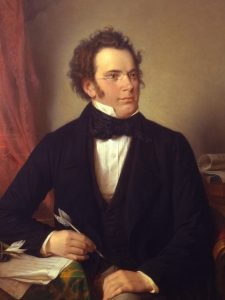
By Robert Croan
Among the entire chamber music repertoire, the Andante movement from Franz Schubert’s String Quartet No. 14 in D minor, known as the “Death and the Maiden” Quartet, is one of the most sublime moments. A highlight of Western classical music in its emotional impact and veracity, this series of variations on an earlier Schubert song that gives the work its nickname runs the gamut of what music can express — each segment concise and meaningful.
In a sold-out performance by players from the South Florida Symphony Orchestra [July 21 at Fort Lauderdale’s Center for Spiritual Living] this music came vividly to life as part of a program that also included Ludwig van Beethoven’s String Quartet No. 11 (in F minor, Op. 95), another outpouring of high anxiety and drama, to which the composer bestowed his own epithet, the “Serioso” Quartet.
This program — also played the previous evening at Miami’s Barry University — was the conclusion of SFSO’s 2023 summer chamber music series, an important addition to South Florida’s cultural life, which offers few opportunities to hear great music live during the off-season months. Now that the series is established for its second consecutive season, however, the players should think of expanding their repertory to include music from the last 50-75 years.
Each of the two works last weekend, composed within 14 years of each other (Beethoven’s in 1810, Schubert’s in 1824) conveys high passion and personal agitation. Beethoven’s was an angry response to Napoleon’s invasion of Vienna and the loss of newly acquired, hard-won liberties, which has unsettling parallels to the times we are living through now.
Schubert’s was a fearsome yet comforting depiction of the figure of Death coming for a young person — reflecting his own soon-to-be-fatal illness (alternatively said to be typhoid fever or late-stage syphilis). Beethoven, however, retained the detachment and formal structures of the Enlightenment, while the younger Schubert pushed the boundaries, with an expansive approach embodying the oncoming era of Romanticism.
In performance at the intimate CSL auditorium, the renditions took on a particularly individualistic quality, partly for the close-up and personal atmosphere but also for the palpable enthusiasm of the players — violinists Huifang Chen and Mei Mei Luo, violist Felicia Besan and cellist Christopher Glansdorp. The joy of their playing together in small combinations in a small setting is what chamber music is all about, and from the first measures of the “Serioso” it was evident that the pleasure was to be a shared proceeding.
These four excellent artists dug into Beethoven’s unison opening statement with a zest and vigor that abounded through the evening. They made the most of the unexpected crashing chords that punctuated the development section, the mini-fugue that invades the slow movement (sometimes said to conjure up Romeo and Juliet), and the syncopated rhythms of the Scherzo. Particularly appealing was the slow introduction to the final movement, a brief lyrical respite from the work’s pervasive sense of antagonism. And then there’s the unexpected superfast coda, in which these artists reveled in conveying a victorious conclusion.
The Schubert quartet is also a torrent of struggle and conflict. From their assertive Allegro declaration, these performers imparted a quasi-orchestra quality that belied the actual size of the ensemble. They were not afraid to sacrifice at moments, tonal beauty in favor of tough rhythmic acerbity, or to tone down to a brief pianissimo that might get lost in the overall texture.
The “Death and the Maiden” movement elicited breath-holding silence and a release at the end that almost but not quite prompted interruptive applause. It’s the “Death” section of the song (rather than the Maiden’s plea) that forms the basis: an otherworldly harmonic progression, unique in the literature, that gave Schubert an opportunity to outdo an already impeccable composition from his past.
This Scherzo is anything but a joke and here it was properly fierce, while the last music — an unforeseen light tarantella, was an audience pleaser that sent the capacity audience home humming its catchy little tunes. What a delightful way to have spent a hot midsummer evening!